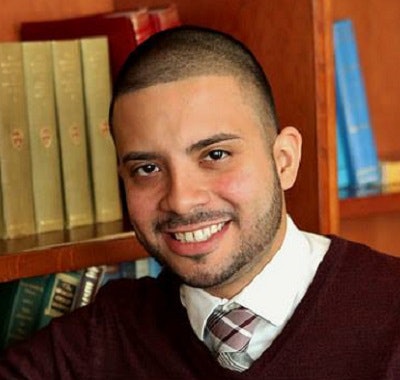Why should we hire you as an assistant professor in our program?
This is the daunting question I need to answer with everything that is required when applying to jobs. Although varying in length and amount of documents required, generally, I am uploading a most-up-to-date C.V., a cover letter, a statement on my teaching philosophy, a statement on research and at least one publication sample.
 Andrew Martinez
Andrew MartinezAs the anxiety of being on the academic market creeps up, I have to remind myself that success is not defined by securing the job, but rather by submitting the best application possible. Too often, I compare myself to others or think I am not good enough. Open-rank positions terrify me. Why would they choose a junior scholar over someone more experienced? Will my graduate school grants compare to a senior scholar who has secured fellowships and foundation grants?
When it gets overwhelming, I try to remind myself what it was like being on search committees as an undergraduate. During that experience, I learned that generally, there is some niche or type of scholar that a given committee is looking for that may not be in the application information. While some applications may emphasize seeking a scholar who uses certain methodologies, or whose work is social justice-oriented, the culture of the department, the students they serve and what the general community thinks their institution needs in a new professor all play a major role in the decision-making for hiring.
Here is some advice I have learned from my mentors or by participating in search committees:
Institutional type matters, but don’t expect them all to follow a stereotype.
As a graduate student at a research-intensive school, I feel like we are socialized into prioritizing other research-intensive institutions. We learn that these institutions are hubs of research productivity in that they received substantial amount of funding for being research-intensive, along with the grants that their faculty are likely to obtain.
While I believe teaching is important and should be a priority for faculty, the stereotype often heard about research-intensive schools is that teaching isn’t necessarily valued as much, and because of this, faculty will focus more of their time and energy seeking grants and publishing articles and books. A teaching institution will differ. While there are expectations of producing quality research, your success on the tenure track has more to do with your teaching than how many articles you get published in top-tier journals.
What I am learning, however, is that there are a lot of “in-between” schools, too. Faculty discussing tenure in their respective programs, or academics on Twitter, talk about small liberal arts schools being in the middle — expectations of high-quality research and teaching. Or comprehensive universities or R2 institutions that have a growing research or teaching agenda.
These priorities may shift. I am being advised to keep my options open. When applying to faculty positions, it is important to try and get a sense of where the institution is heading, and how you can help support that vision.
It’s not you, it’s them.
I think the most nerve-wracking part of applying to faculty positions is trying not to feel as though you are not “good enough” for an interview. Being on search committees has shown me how subjective it can be for committee members to select which candidates to advance. It really depends on who is in the room and how they will advocate for the select few candidates that they feel strongly about.
That is why the application materials are so important. You have to somehow connect with the committee personally through the cover letter and statements while impressing them with what you have done so far with your C.V. However, everyone has their own biases and preferences. If you don’t make it the first round, or you don’t get the offer after several interviews — try your best to remember it’s not you, it’s them.
Is the institution able to support you and your work?
Institutional fit matters. You might be an outstanding candidate, but does the search committee think that their department and/or school is prepared to support you and your work? How does your research agenda coalesce with what other faculty are doing, what students are seeking or what the department or school has going on? All of these factors may matter.
Related to my other point, sometimes it is not about you and your work, but rather what the institution is specifically looking for. While some schools may be specific in their calls for applicants, many are not, even though the department chair or school community has a certain type of scholar in mind.
Overall, what I have gathered from all the advice I’ve been getting is that a lot of this is beyond my control. What I can control are my application materials — something that I should continually seek to improve. I need to reach out to my communities of support to help improve my materials and remember that I will bring tremendous value to wherever I begin my career as a professor.
Andrew Martinez is a Ph.D. candidate at the University of Pennsylvania’s Graduate School of Education and a research associate at the Rutgers Center for Minority Serving Institutions. You can follow him on Twitter @Drewtle


















